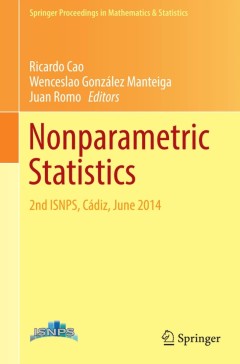Filter by

Good Governance in the Era of Global Neoliberalism Conflict and Depolitizati…
This new collection critically examines the new global policy of 'good governance'. This catchphrase of aid policy and development thinking has been the subject of too little analysis to date. This book redresses the balance. It places the prefix 'good', and exactly what that means, under the microscope and examines the impact of neoliberal governance in a wide range of countries and territorie…
- Edition
- -
- ISBN/ISSN
- 9780203478691
- Collation
- -
- Series Title
- -
- Call Number
- -

On Moral Capital
This book promotes the original concept of “Moral Capital” as the key to analyzing the nature and function of morality in economic activities. The book is divided into three major sections. In the first, the author argues that the logical connections between morality and economy and those between morality and profit provide a concrete theoretical basis for the concept of moral capital. In t…
- Edition
- 1
- ISBN/ISSN
- 978-3-662-45543-2
- Collation
- XI, 266
- Series Title
- -
- Call Number
- -

Mathematics of Economics and Business
For all students who wish to understand current economic and business literature, knowledge of mathematical methods has become a prerequisite. Clear and concise, with precise definitions and theorems, Werner and Sotskov cover all the major topics required to gain a firm grounding in this subject including sequences, series, applications in finance, functions, differentiations, differentials an…
- Edition
- -
- ISBN/ISSN
- 9780203401385
- Collation
- -
- Series Title
- -
- Call Number
- -

Demand Forecasting for Inventory Control
This book describes the methods used to forecast the demands at inventory holding locations. The methods are proven, practical and doable for most applications, and pertain to demand patterns that are horizontal, trending, seasonal, promotion and multi-sku. The forecasting methods include regression, moving averages, discounting, smoothing, two-stage forecasts, dampening forecasts, advance dema…
- Edition
- -
- ISBN/ISSN
- 9783319119762
- Collation
- -
- Series Title
- -
- Call Number
- 338.7

Energy, Wealth and Governance in the Caucasus and Central Asia Lessons not l…
Drawing upon recent progress in development economics and political science, the book provides fresh analysis of the Caucasus and Central Asia (CCA) countries transition to a market economy by tracing the impact of natural resource endowment. The book examines the synergies between energy-rich and energy-poor states and highlights the practical consequences of both well-managed and poorly-manag…
- Edition
- -
- ISBN/ISSN
- 9780203099803
- Collation
- -
- Series Title
- -
- Call Number
- -

OPEC in a Shale Oil World
OPec in a sHALE oil world –where to NEXT? With PREFACE by Dr. Sadad Al Husseini , former Board Member and Executive Vice President , Saudi Aramco. "OPEC has played an important role since its founding and continues to do so, but it has to recognize that this role has now changed and the organization has to adapt to new challenges. This book provides some possible solutions" Abdulsamad Al A…
- Edition
- 1
- ISBN/ISSN
- 978-3-319-22370-4
- Collation
- XXX, 269
- Series Title
- -
- Call Number
- -

Firm Innovation and Productivity in Latin America and the Caribbean
This volume uses the study of firm dynamics to investigate the factors preventing faster productivity growth in Latin America and the Caribbean, pushing past the limits of traditional macroeconomic analyses. Each chapter is dedicated to an examination of a different factor affecting firm productivity - innovation, ICT usage, on-the-job-training, firm age, access to credit, and international lin…
- Edition
- -
- ISBN/ISSN
- 978-1-349-58151-1
- Collation
- XXV, 346
- Series Title
- -
- Call Number
- -

Nudge Theory in Action: Behavioral Design in Policy and Markets
This collection challenges the popular but abstract concept of nudging, demonstrating the real-world application of behavioral economics in policy-making and technology. Groundbreaking and practical, it considers the existing political incentives and regulatory institutions that shape the environment in which behavioral policy-making occurs, as well as alternatives to government nudges already …
- Edition
- 1
- ISBN/ISSN
- 978-3-319-31318-4
- Collation
- XIX, 351
- Series Title
- Palgrave Advances in Behavioral Economics
- Call Number
- -

Nuclear Waste Governance:An International Comparison
This volume examines the national plans that ten Euratom countries plus Switzerland and the United States are developing to address high-level radioactive waste storage and disposal. The chapters, which were written by 23 international experts, outline European and national regulations, technology choices, safety criteria, monitoring systems, compensation schemes, institutional structures, and …
- Edition
- 1
- ISBN/ISSN
- 978-3-658-08961-0
- Collation
- XXII, 327
- Series Title
- Energiepolitik und Klimaschutz. Energy Policy and Climate Protection
- Call Number
- -

Nonparametric Statistics
This volume collects selected, peer-reviewed contributions from the 2nd Conference of the International Society for Nonparametric Statistics (ISNPS), held in Cádiz (Spain) between June 11–16 2014, and sponsored by the American Statistical Association, the Institute of Mathematical Statistics, the Bernoulli Society for Mathematical Statistics and Probability, the Journal of Nonparametric Stat…
- Edition
- 1
- ISBN/ISSN
- 978-3-319-41581-9
- Collation
- XI, 224
- Series Title
- Springer Proceedings in Mathematics & Statistics
- Call Number
- -
 Computer Science, Information & General Works
Computer Science, Information & General Works  Philosophy & Psychology
Philosophy & Psychology  Religion
Religion  Social Sciences
Social Sciences  Language
Language  Pure Science
Pure Science  Applied Sciences
Applied Sciences  Art & Recreation
Art & Recreation  Literature
Literature  History & Geography
History & Geography